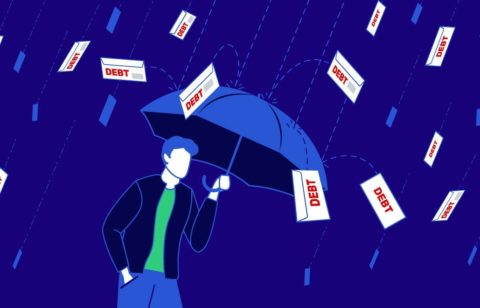Ask anyone who is struggling under a load of big debt what they’d like most in the world and the odds are they’ll say what they want is to get rid of it. Big debt and by this we mean debts of $20,000, $30,000 or more can actually cause families to unravel.
What it does to your finances
One of the biggest problems with big debt is what it does to a family’s finances. Here’s an example of what we mean. Let’s suppose you owe a total $30,000 in credit card debts at an average interest rate of 19%. This means it’s costing you, at the minimum, $775 a month – just to pay the interest plus 1% of your balances. If you have take-home income of, say, $4800 a month your credit card debt is eating up 16% of your income and is not really buying you anything. It’s just throwing good money after bad. If you were to decide to pay off that $30,000 in debt in just three years, your monthly payment would balloon to nearly $1100 a month or 22% of your take home pay. This would leave just 78% of it to pay for everything else and would leave little room for discretionary spending.
Guilt, anger and finger-pointing
A second problem with big debt is that it often leads to arguments over whose fault it was. In a best case scenario the two of you would be equally responsible for running up those debts.. However, what’s more likely is that one of the two of you was more responsible than the other. When this is the case, it can lead to a lot of finger pointing, foot stomping and terrible arguments. The one of you who was responsible for running up the debt can feel guilty and ashamed while the other is angry, frustrated and scared.
Marital strife
This can lead to a succession of arguments, which will put a lot of stress on the marriage or even lead to divorce. MSN Living recently had an article listing the eight top most common reasons for divorce as follows:
- Lack of commitment
- Too much arguing
- Infidelity
- Marrying too young
- Unrealistic expectorations
- Lack of equality
- Lack of preparation
- Abuse
As you can see number two was too much arguing. It’s not much of a stretch to guess that a lot of that arguing had to do with finances and debt. I saw another article where money problems were cited by 15% of the respondents as the primary reason for their divorces.
It takes time and patience
If you’re struggling with debt and it’s having a seriously negative affect on your relationship or marriage, what can you do? The first and most important thing is for the two of you to sit down and try to discuss the problem calmly. Regardless of who caused the debt, the two of you must be able to work together as a team to resolve it, which means putting any anger or hurt feelings aside. Instead of focusing on whose fault it was, the two of you need to concentrate on how you can solve the problem. This might begin by sitting down and creating a budget – if you don’t already have one. But before you can do this, you need to track your expenses for about a month. Both of you need to write down every transaction, right down to that $3 fast food lunch. Both of you will need to be honest and willing to trust each other’s honesty. There can be no secrets at this point.
Why a budget is critical
There are several reasons why you need a budget. The first is that it’s the only way you can learn where your money’s going and then make a plan for the future. In fact, you might think of your budget not as a budget but as a game plan. Naturally, your plan will have to include a provision for paying down your debts. Again, the two of you must be able to reach agreement as to how you will do this. If you were to cut your spending by $500 a month and add this to whatever you’re currently paying on your debts, you might be debt free in less than three years.
Do you both work?
If you both work you might be able to develop a budget wherein you live on one person’s salary and then use the other’s to pay down your debt. As an example of this if your spouse or partner was taking home $2000 a month and you could apply all of that to clearing your debts, you might be able to become debt free in just a little over a year.
Snowball your debts
Regardless of which of these alternatives you choose, you should try to snowball your debts. The way that you do this is to list all of them with their interest rates and balances. Then sort the list so that the one at the top is the debt with the smallest balance down to the one with the largest. You then put all of your resources against paying off the debt with the smallest balance, which will then free up money that can be used to begin paying off the one with the second smallest balance and so on. Alternately, you could sort your debts with the one that has the highest interest rate at the top down to the one with the lowest. Some experts feel this could be a better option because the debt with the highest interest rate is costing you the most money. So, if you were to get rid of it you would then have the maximum amount of money to pay off the debt with the next highest interest rate.
Stick with the plan
Whatever you decide to do about your family’s debt, be sure to stick to whatever plan you and your spouse or partner developed and agreed to. This will stop the arguments and finger-pointing and probably take much of the stress and strain out of your marriage. Or as Martha Stewart is fond of saying, “it’s a good thing.”
Here’s a video that reveals seven other things you could do to improve your marriage.





